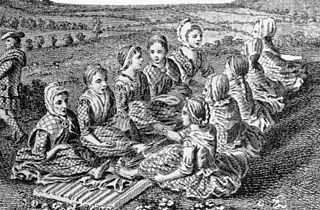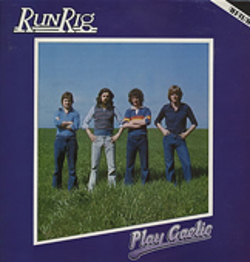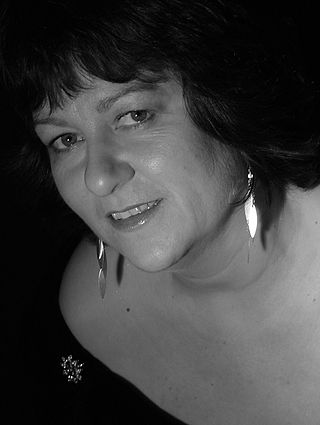
Scottish country dance (SCD) is the distinctively Scottish form of country dance, itself a form of social dance involving groups of couples of dancers tracing progressive patterns. A dance consists of a sequence of figures. These dances are set to musical forms which come from the Gaelic tradition of Highland Scotland, as do the steps used in performing the dances. Traditionally a figure corresponds to an eight-bar phrase of music.

The schottische is a partnered country dance that apparently originated in Bohemia. It was popular in Victorian era ballrooms as a part of the Bohemian folk-dance craze and left its traces in folk music of countries such as Argentina, Finland, France, Italy, Norway ("reinlender"), Portugal and Brazil, Spain, Sweden, Denmark, Mexico, and the United States, among other nations. The schottische is considered by The Oxford Companion to Music to be a kind of slower polka, with continental-European origin.
A strathspey is a type of dance tune in 4
4 time, featuring dotted rhythms, which in traditional playing are generally somewhat exaggerated rhythmically. Examples of strathspeys are the songs "The Bonnie Banks o' Loch Lomond" and "Coming Through the Rye".
Catherine-Ann MacPhee is a Scottish Gaelic singer from Barra in the Hebrides, now resident in Canada. She has worked in the theatre and broadcasting as well as giving musical performances in Scotland, England, Canada and elsewhere. After a period living in Ottawa she moved to Halifax, Nova Scotia, in 2017.

Cape Breton fiddling is a regional violin style which falls within the Celtic music idiom. The more predominant style in Cape Breton Island's fiddle music was brought to North America by Scottish immigrants during the Highland Clearances. These Scottish immigrants were primarily from Gaelic-speaking regions in the Scottish Highlands and the Outer Hebrides. Although fiddling has changed considerably since this time in Scotland, it is widely held that the tradition of Scottish fiddle music has been better preserved in Cape Breton. While there is a similar tradition from the Irish-style fiddling, that style is largely overlooked as a result of the strong Scottish presence in the area.

Highland dance or Highland dancing is a style of competitive dancing developed in the Scottish Highlands in the 19th and 20th centuries, in the context of competitions at public events such as the Highland games. It was created from the Gaelic folk dance repertoire, but formalised with the conventions of ballet, and has been subject to influences from outside the Highlands. Highland dancing is often performed with the accompaniment of Highland bagpipe music, and dancers wear specialised shoes called ghillies or pumps. It is now seen at nearly every modern-day Highland games event.
Puirt à beul is a traditional form of song native to Scotland that sets Gaelic lyrics to instrumental tune melodies. Historically, they were used to accompany dancing in the absence of instruments and to transmit instrumental tunes orally.

Waulking songs are Scottish folk songs, traditionally sung in the Gaelic language by women while fulling (waulking) cloth. This practice involved a group of women, who traditionally prepared cloth, rhythmically beating newly woven tweed or tartan cloth against a table or similar surface to lightly felt it and shrink it to better repel water. Simple, beat-driven songs were used to accompany the work.
The Scots Trad Music Awards or Na Trads were founded in 2003 by Simon Thoumire to celebrate Scotland's traditional music in all its forms and create a high profile opportunity to bring the music and music industry into the spotlight of media and public attention. Nominations are made by the public and in 2019 over 100,000 public votes were expected across 18 categories.
Lilting is a form of traditional singing common in the Goidelic speaking areas of Ireland, Scotland and the Isle of Man, though singing styles like it occur in many other countries. It goes under many names, and is sometimes referred to as diddling, mouth music, jigging, chin music or cheek music, puirt à beul or canntaireachd in Scottish Gaelic, or portaireacht bhéil in Irish. The syllables sung do not require any one-to-one corresponding note, and in this way it resembles scat singing, and is distinguished from the singing of sol-fa or sargam.
"Mairi's Wedding" is a Scottish folk song originally written in Gaelic by John Roderick Bannerman (1865–1938) for Mary C. MacNiven (1905–1997) on the occasion of her winning the gold medal at the National Mòd in 1934. In 1959, James B. Cosh devised a Scottish country dance to the tune, which is 40 bars, in reel time.

Play Gaelic is the first album by the Scottish Celtic rock band Runrig. It was released in 1978 on LP and tape by Neptune Records. In 1990 it was re-released on CD by Lismor Recordings with different cover art.

Fiona J. Mackenzie is a Scottish Gaelic traditional singer from Dingwall, Highland Scotland, and has toured and performed throughout Europe and North America. In 2005, she won the An Comunn Gàidhealach Gold Medal at the Royal National Mòd in Stornoway.

Dual is an album by four acclaimed Irish and Scottish musicians: Éamon Doorley, Muireann Nic Amhlaoibh, Julie Fowlis and Ross Martin.
Gaelic folk music or Gaelic traditional music is the folk music of Goidelic-speaking communities in Ireland, Scotland, and the Isle of Man, often including lyrics in those languages. Characteristic forms of Gaelic music include sean-nós and puirt à beul singing, piobaireachd, jigs, reels, and strathspeys.
Flora MacNeil, MBE was a Scottish Gaelic Traditional singer. MacNeil gained prominence after meeting Alan Lomax and Hamish Henderson during the early 1950s, and continued to perform into her later years.
Colin Campbell and His Highland Band were a west coast swing band in Scotland through the mid-1960s to the 1980s. Dressed in Ancient Campbell tartan jackets, they released several albums, EPs, singles and cassette tapes for both the Beltona/Decca and Lismor Recording Companies.

Canadian fiddle is the aggregate body of tunes, styles and musicians engaging the traditional folk music of Canada on the fiddle. It is an integral extension of the Anglo-Celtic and Québécois French folk music tradition but has distinct features found only in the Western hemisphere.
Dàimh is a folk band which performs in Scottish Gaelic.

Anna "Annie" Arnott was a Scottish singer who sang in Scottish Gaelic in the puirt à beul style.